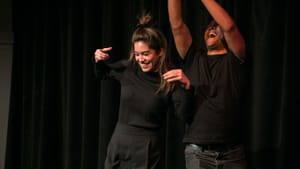Stay in the Loop
BSR publishes on a weekly schedule, with an email newsletter every Wednesday and Thursday morning. There’s no paywall, and subscribing is always free.
My own romantic comedy
On my Philly Valentine’s day, here’s what being a hopeless romantic really means

For the past few years, I have eagerly anticipated Valentine’s Day—not because I’m looking out for flowers from a lover, but because of my affair with Philly’s annual Not Yet Rated: An Improvised Rom-Com. I don’t usually participate in V-Day festivities, but I am a hopeless romantic, primed since childhood with the tropes, structures, and characters of love stories that had a profound influence on my perspectives of love and relationships long before I explored them on and off the stage.
Meet-lose-get
Like many kids, I was indoctrinated into the world of romantic love through Disney. The sweeping colors, the music (I owned many soundtracks), and the inevitable happy ending filled me with joy and comfort. At the heart of these fantastical movies is often a love story, which basically makes Disney romantic comedies for children. The narrative is simple, and usually results in a woman being “saved” by a man, like in Snow White or Cinderella. Love is life’s ultimate goal, the thing that completes you. I wanted that love, and I longed to feel that completion. One day, love was going to save me.
The romantic comedy was the next level in my unsolicited love education. Billy Mernit, author of Writing the Romantic Comedy, defines the genre as “a comedy whose central plot is embodied in a romantic relationship,” and summarizes the structure in three acts: “meet-lose-get.” This lends itself to an endless array of subgenres, including teen (Can’t Hardly Wait), period (Pride & Prejudice), and action (Date Night), to name only a few.
“Romantic comedy protagonists tend to be emotionally incomplete,” Mernit says. As the characters face internal and external obstacles, love is the driving force that allows them to confront and expose themselves in ways they never have before.
Comfortable love
When I started to develop real-life romantic interests, love felt so intimate, like a secret. My parents and I never talked about “who I liked at school,” perhaps unwilling to tolerate such a vulnerable conversation. I was never casual about love. I became a serial monogamist who dated friends, coworkers, or people I already knew (my current partner the only exception to this pattern.) I longed for a romantic chance encounter, but I didn’t have the patience to wait, or the courage or confidence to date strangers.
Since I was not interested in stepping out of my comfort zone, or confronting my issues, romantic comedies offered me a cathartic space to experience the rollercoaster of romantic love with no personal consequences. I could enjoy an awkward and fumbly meet-cute, listen to others proclaim their love, and feel the intensity of a lovers’ quarrel knowing that in the end it would all work out, for better or for worse. I lived vicariously through characters who pushed themselves in ways I couldn’t.
What I deserve
My warped perceptions of love got me into relationships that were toxic and unhealthy. A lot of rom-coms obscure healthy boundaries and flout acceptable behavior (like the shocking “To me you are perfect” scene from Love Actually). Through many romantic failures, I reeducated myself on what I deserve, and what I want.
After a breakup a couple years ago, I had what my therapist called a “year of romantic sobriety.” I was single. Romance was not a priority; in fact, it was barely on my mind. During that time, I went into a bar in Fishtown; I sat at the bar and talked to a bartender for most of the night. It was a nice conversation, but I left thinking nothing of it. A year later we went on a date, and the rest is history.
What the hopeless romantic believes
I believe there is a healthy way to watch romantic comedies. “I regard romantic comedies as a subgenre of sci-fi, in which the world operates according to different rules than my regular human world,” Mindy Kaling writes in the New Yorker. “For me, there is no difference between Ripley from Alien and any Katherine Heigl character. They are equally implausible.”
I wish someone had told me this when I was growing up. But nowadays, I am able to enjoy the world for what it is—even the cheesy fairytale come to life.
Just like confronting our fears in horror movies, or enjoying a vicarious sense of heroism in action movies, romantic comedies encourage taking risks. In summer 2016, I was in Germany visiting my parents. I had been living in Philly for a year and was eager to get involved with theater in any way I could. I saw a call for sketch-team performers, and immediately requested an audition despite having no comedy experience. My flight back to Philly was on that same day. I went straight from the airport to the audition, delirious from travel, with a monologue scribbled on a sheet of paper. That moment sparked a series of events that led me to performing in Not Yet Rated. To be a hopeless romantic is to believe, against all odds, that something is possible.
Image description: A photo of Kelly Conrad, a Filipino American woman, performing next to a male costar. They’re both wearing black, with a black curtain behind them. Their arms are in the air and they’re grinning as they act out an improv scene.
What, When, Where
Not Yet Rated: An Improvised Rom-Com. Directed by Mike Marbach, featuring Gab Bottoni, Fred Brown, Kelly Conrad, Andrew Coppola, Wilfredo Diaz, Matt Garren, Marcely Jean-Pierre, Daralyse Lyons, Stacie Lyons, and Brendan Manklang Kingston. Performances streaming through February 14, 2021. Find tickets at notyetratedimprov.com.
Sign up for our newsletter
All of the week's new articles, all in one place. Sign up for the free weekly BSR newsletters, and don't miss a conversation.

 Kelly Conrad
Kelly Conrad